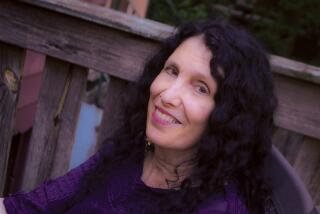In ‘Nothing Right,’ writer Antonya Nelson homes in on modern life’s contradictions
The house Antonya Nelson shares with her husband, writer Robert Boswell, and their two grown children, Noah, 18, and Jade, 21, is doeskin adobe, built in 1910, surrounded by dusty, shaded sage plants.
Inside, there is color everywhere: flowers, pottery, paintings by local artists. The dining room is lined with books, stunningly alphabetized. The kitchen table has blue glass bowls filled with carrots and cherry tomatoes. Even the dogs’ dishes are painted with colorful flowers.
Nelson is wearing a fiesta-style skirt and low Frye boots. Her children are passionate about art: Noah, music, and Jade, painting. There is order. There is color. Anyone could write a book in this house.
Or could they? Nelson is 130 pages into a new novel and she’s hankering to write short stories, a “naughty pleasure.” Her latest book, the collection “Nothing Right” (Bloomsbury: 296 pp., $25), is vintage Nelson: It’s full of contrarian views of modern life, swift eviscerations of simpering morality, the complicated love between parents and children, brinkmanship with psychosis and everyday breakdowns, a culture that makes adolescents of us all, a lot of alcohol and a smattering of infidelity.
And why not? Nelson is the daughter of two English professors; two of her four siblings are psychologists; sarcasm was the lingua franca of her childhood home in Wichita, Kan.
“I have,” she explains, “a huge capacity for listening to people’s problems. Writers are uniquely suited to observe. This is why they end up drinking a lot, to desensitize. They are always slightly on the outside.”
Today at the gym, Nelson found herself unable to resist the temptation to remove her earplugs. The women next to her were discussing hairdressers and the pitfalls of dieting, namely the negative effects on hair.
“The story I’m working on has a character who is the former owner of a beauty school,” she says, delighted and yet not entirely surprised by the coincidence. “I spend a lot of time scribbling notes on the backs of books I’m reading. Everything feeds the story I’m working on.”
Nelson’s work has long been admired by many of our finest writers -- Raymond Carver, David Foster Wallace (who attended the University of Arizona master of fine arts program with her), Michael Chabon.
Her first book, “The Expendables,” won the Flannery O’Connor Award for Short Fiction; she has also won the PEN/Nelson Algren Award, the Rea Award, the O. Henry, the Pushcart, a grant from the National Endowment for the Arts and a Guggenheim. Her stories have appeared in the New Yorker, Esquire, Harper’s and Redbook.
She has taught all her writing life, at the University of New Mexico and now at the University of Houston. “There have been many years,” she says, “when the income from writing was zero; teaching has always been our main source of income. Academia makes it possible to have a pure relation with the art form.”
Teaching, Nelson points out, is useful for another reason; it keeps a writer from getting “too self-involved.” But reading -- reading is critical. Reading, she says, enables you to “step into someone else’s shoes. People are dying to have frivolous, meaningless conversation -- characters in books are so much more intimate. I feel sorry for people who don’t read fiction. They must be so lonely.”
Nelson visits the Richard Riordan Central Library on Wednesday evening as part of the ALOUD series.
Nelson’s kitchen table is covered with manuscripts: She’s judging the PEN/Faulkner Award for fiction this year. “It’s slim pickings in short stories,” she says. “Nobody is taking risks on first books.”
Still, Nelson notes, “there’s a lot of good second-generation immigrant fiction out there now. Students seem to be reading more for plot than they used to; male students used to like Raymond Carver; now they read Cormac McCarthy. We are so attached, as Americans, to the idea of family. A lot of fiction tries to make families out of misfits.”
Much of Nelson’s writing deals with family. When she was a young mother, she wrote about young motherhood. When her kids were adolescents, she wrote about adolescence.
“My work tends to be more upsetting than Robert’s,” she says, describing dinners at which her family joked about her taking notes.
“The sentences my children have reacted to are not necessarily the ones I thought they would react to,” she says. But she has often been surprised at how her children take her work in stride.
Once, Nelson opened a box of new books to show the kids the dedication -- to them. “They said, ‘Cool,’ and went back to their TV show,” she recalls, and shrugs.
“There are stories I couldn’t write now,” she continues. “I’m interested in divorce -- in what would happen if . . . what would I . . .” Her voice trails off. “The road not taken is the fiction writer’s gift.”
Having more than one house, Nelson concludes -- the family moves between Las Cruces, Houston, Telluride, Colo., and a Colorado ghost town where they recently purchased three blocks -- takes the place of infidelity by keeping things interesting.
Nelson does not romanticize the writing life. “When I write a short story,” she says, “I want to write it. I would have written it anyway, with or without a contract.”
Periodically, she writes nonfiction, but it’s fiction she prefers. As for the line between the two, she acts as if it’s just common sense: “Lying is an outlet for the imagination. Properly channeled, it becomes fiction. Improperly channeled, it’s a lawsuit.”
Nelson has written a lot about the Kansas home in which she grew up, and her parents, whom she admired. She remembers a bohemian household surrounded by Republicans. She has never lived in a place where people like her were in the majority.
“I’m always writing against something,” she says. “There’s this little rebel in me making noise.” That’s why she likes the short story, because it’s a good form for small movements, changes and rebellions. “I don’t,” she adds, “have any great aspirations to change someone’s view of the world.”
The novel Nelson is writing is based on a Wichita serial killer who haunted her adolescence. “Adolescence is a lot like middle age,” she says, sipping a margarita, “there’s a certain lack of control.”
This can be true of novel-writing also. “I have no gift for plot,” Nelson says. “I prefer to think of writing in terms of shape.”
As for her interest in alcohol and infidelity, she refuses to judge her characters: “I happen to know marriages that were saved by infidelity. I happen to know lives that were eased by alcohol.”
Nelson tells a story about a missing-child poster she saw recently on a telephone pole in her neighborhood. The story could be fact, it could be fiction. “It made the missing girl sound like a missing pet,” she says of the poster. “The father is a transsexual who used to be her mother.”
For her, though, that poster is now something bigger. Something about it has taken root. “Why?” Nelson asks. “Is it because of my secret desire as an adolescent to be a boy? Maybe I’ll write about it and figure something out.”
More to Read
The biggest entertainment stories
Get our big stories about Hollywood, film, television, music, arts, culture and more right in your inbox as soon as they publish.
You may occasionally receive promotional content from the Los Angeles Times.






